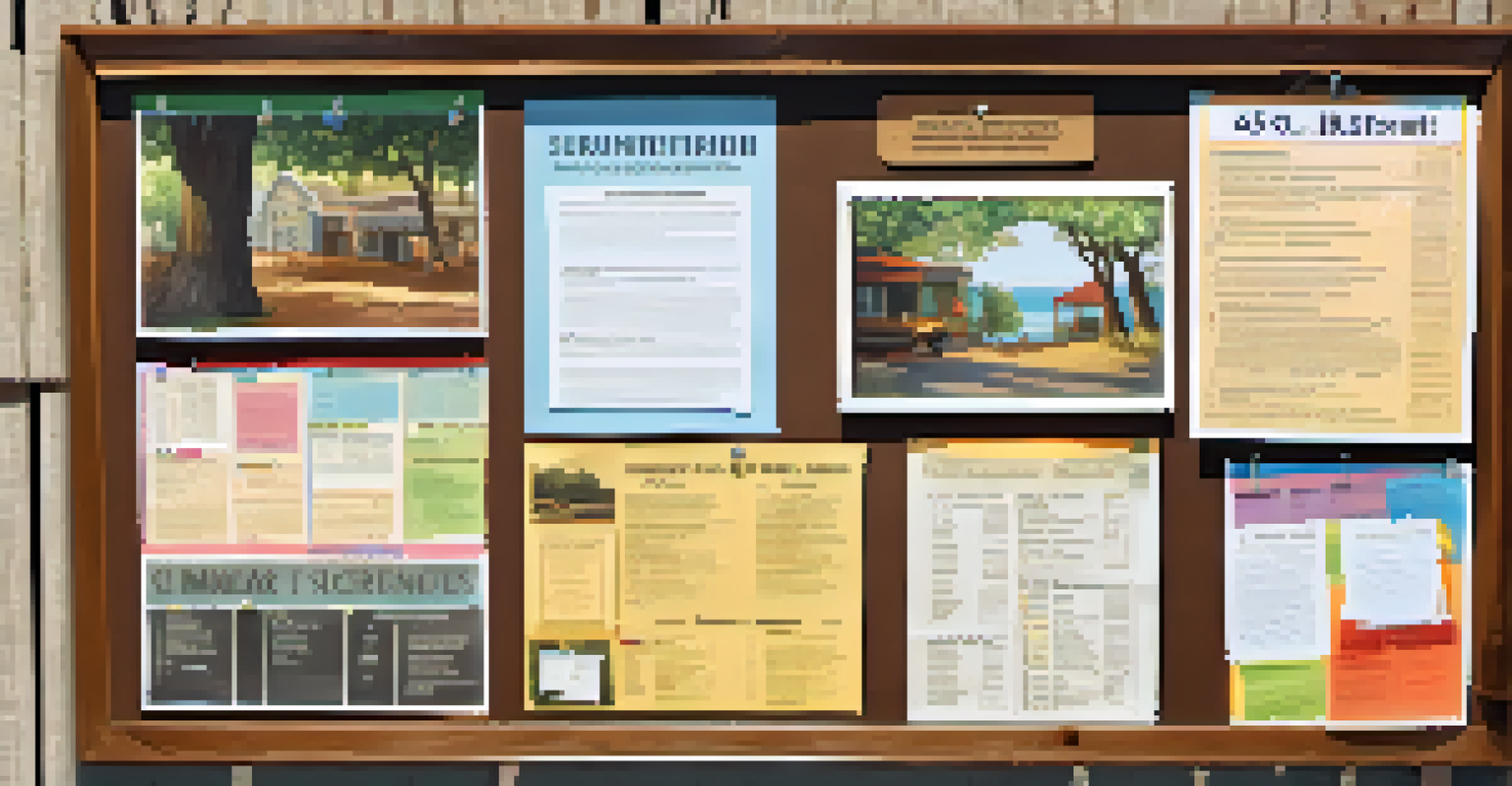How to Communicate Effectively with Your HOA Board

Understanding the Role of Your HOA Board
To communicate effectively with your HOA board, it's crucial to understand their role and responsibilities. Your board is made up of fellow homeowners who volunteer their time to manage community affairs, which can often be a challenging task. Knowing what their duties entail can help you frame your questions and concerns in a way that resonates with them.
The single biggest problem in communication is the illusion that it has taken place.
HOA boards typically oversee maintenance, enforce community rules, and manage finances. By recognizing these responsibilities, you can tailor your communication to address specific issues that impact the community. For instance, if you're concerned about landscaping, knowing who oversees that aspect can guide your discussion.
Additionally, understanding the board's decision-making process can improve how you present your ideas. If you know they meet monthly to discuss community matters, you can prepare your thoughts and submit them in advance, ensuring your voice is heard.
Choosing the Right Channel for Communication
The method of communication can significantly influence how your message is received by the HOA board. Whether you choose to email, attend a meeting, or use a community forum, consider the context of your message. For straightforward concerns, a brief email may suffice, while more complex issues might warrant a face-to-face discussion.

It's also essential to respect the preferred communication channels set by your HOA. Many boards have established protocols for submitting requests and concerns, often outlined in community guidelines. By adhering to these protocols, you demonstrate respect for their processes and increase the likelihood of a positive response.
Understand HOA Board Roles
Knowing the responsibilities of your HOA board can help you communicate effectively and address specific community issues.
Lastly, make sure to be clear and concise in your chosen medium. A well-structured email or a succinct speech at a meeting can make a lasting impression and effectively convey your message. Aim for clarity to avoid misunderstandings that can arise from vague communication.
Be Prepared with Relevant Information
Preparation is key when engaging with your HOA board. Before reaching out, gather all relevant information, including any documents, community rules, or previous communications related to your concern. This preparation allows you to present a well-informed argument that demonstrates your commitment to the community.
A good leader takes a little more than his share of the blame, a little less than his share of the credit.
For example, if you're advocating for a new playground, research the costs and benefits, as well as community interest. Presenting data not only backs up your request but also shows the board that you’ve done your homework. This approach can lead to more constructive conversations and a better understanding of your proposal.
Additionally, being informed about past board decisions or discussions can help frame your request appropriately. By acknowledging previous efforts or decisions, you show that you respect the board's work and are interested in collaborating rather than merely criticizing.
Keep Communication Respectful and Professional
Respect and professionalism are foundational to effective communication, especially with your HOA board. Remember that board members are your neighbors volunteering their time, and approaching them with a positive attitude can foster goodwill. Even during disagreements, maintaining a calm and respectful tone is essential.
Using phrases like 'I understand your perspective, but...' can help convey your viewpoint without dismissing theirs. This approach encourages open dialogue and can lead to more productive discussions. When you express appreciation for their efforts, it builds rapport and makes them more receptive to your concerns.
Choose the Right Communication Method
Selecting the appropriate channel for your message can significantly enhance how it is received by the board.
Moreover, if issues arise, avoid personal attacks or emotional outbursts. Focus on the issue at hand rather than the individuals involved. This helps keep conversations constructive and paves the way for collaborative problem-solving.
Timing Your Communication for Maximum Impact
Timing can significantly influence the effectiveness of your communication with the HOA board. Consider the timing of board meetings or when they are likely to be most receptive to new ideas or concerns. For instance, addressing a concern during a busy season, such as budget planning, may not yield the best results.
Instead, try to engage with the board during quieter periods or after they’ve completed a significant project. This way, they may be more open to discussing new initiatives or addressing community concerns. Additionally, giving board members a heads-up about topics you want to discuss can allow them to prepare and give your concerns the attention they deserve.
Lastly, remember that follow-up is essential. If you've raised an issue, checking in after a meeting or discussion can demonstrate your commitment and keep the conversation alive. This proactive approach shows that you're invested in the community's well-being.
Building Relationships with Board Members
Building strong relationships with your HOA board members can pave the way for effective communication. Take time to introduce yourself and engage with them outside of formal meetings, whether during community events or casual encounters. A friendly rapport can make discussions more productive and enjoyable.
Consider volunteering for community events or committees to deepen your involvement. This not only allows you to work alongside board members but also gives you a better understanding of their challenges and priorities. When you demonstrate a shared commitment to the community, it can strengthen your relationship and improve communication.
Build Relationships with Board Members
Establishing rapport with board members can lead to more productive discussions and a better understanding of community priorities.
Furthermore, being active in community discussions or forums helps establish your presence. By contributing positively and constructively, you position yourself as a reliable member of the community, making it easier for board members to approach you with ideas or concerns in the future.
Following Up and Providing Feedback
After communicating with your HOA board, following up is crucial. Whether you’ve submitted a request or had a discussion, checking in shows your commitment and keeps the lines of communication open. A simple email thanking them for their time and reiterating your points can reinforce your message.
Additionally, providing constructive feedback, whether positive or negative, can help the board improve its processes. If a decision was made that you appreciated, let them know! Positive reinforcement can motivate board members and encourage them to continue making community-focused decisions.

Conversely, if you feel that your concerns were not addressed adequately, express this respectfully. Offer suggestions for improvement rather than just criticism, fostering a collaborative relationship that can lead to better outcomes in the future.